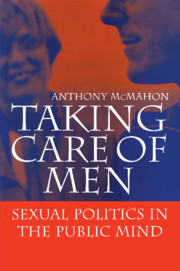2 - Producing Men: The Labour of Love
Published online by Cambridge University Press: 05 October 2010
Summary
The Materialist Paradigm
How is work organised – actual, physical, bodily work – work which makes you tired? The social theoretical perspective which has put the greatest stress on the centrality of work is the materialist perspective. Materialist analyses concern ‘actual individuals, their work, their actual productive activities, and the material conditions produced by these activities’ (Smith 1987: 88) and begin from the standpoint of those who actually do the work. The perspective was first clearly spelt out in The German Ideology by Marx and Engels (1845–46). Their starting point was that people must be able to live in order to make history, and that life involves ‘before anything else eating and drinking, a habitation, clothing and many other things’. The first historical act is, therefore, the ‘production of material life’. This act is necessarily social, always taking place within a social relationship, and always organised according to some mode of production. Interestingly, the earliest statements of the materialist view explicitly included the making of people as well as of things:
The production of life, both of one's own by labour and of fresh life by procreation, appears at once as a double relationship, on the one hand as a natural, on the other as a social relationship. By social is meant the cooperation of several individuals, no matter under what conditions, in what manner or to what end
(Marx & Engels in Bottomore & Rubel 1956: 75, 77).The mode of organisation of cooperative human labour is the key, Marx and Engels believed, to understanding any particular social formation. Domination and oppression are built upon the interested appropriation and exploitation of labour by the ruling class(es) of the day.
- Type
- Chapter
- Information
- Taking Care of MenSexual Politics in the Public Mind, pp. 38 - 62Publisher: Cambridge University PressPrint publication year: 1999



